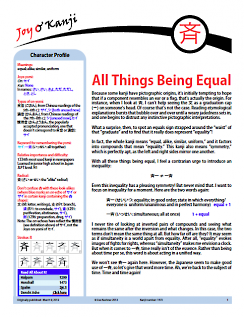斉
equal; alike; similar, uniform; "alike" radical
Kanji 1473
Thank you for visiting this Character Home Page. Below you'll find a synopsis of the essay. If you wish to read the full text, the PDF of the essay is available for purchase to the right.
The equals symbol lies at the heart of 斉, which factors into words about equality, symmetry, and proportion (e.g., "She has a well-proportioned figure."). The most important bit of 斉 vocabulary means "simultaneous." With this word you can say that an audience bursts into laughter together or that birds break into song at the same time. Meanwhile, a negative prefix turns a 斉 compound into a term for "asymmetry," one of the seven principles of wabi-sabi. Also find out when 斉 serves as a radical or component in other characters.
Revision history:
May 26, 2021:
- p. 2: Updated the Henshall etymology.
- p. 5 sidebar: Changed 孤高 to 枯高.
- p. 5: Reworked the discussion of 等 and 均, based on newer Henshall etymologies.
- p. 8: Added a link to the Kanshudo games.
Apr. 3, 2015: p. 7: Where it said, "齊藤: The first kanji is the old and non-Joyo version of 斉," I changed "version" to "variant." Of course, "version" is fine, too, but "variant" is more specific, so it's clearer.
Mar. 9, 2012: Originally published.



Comments